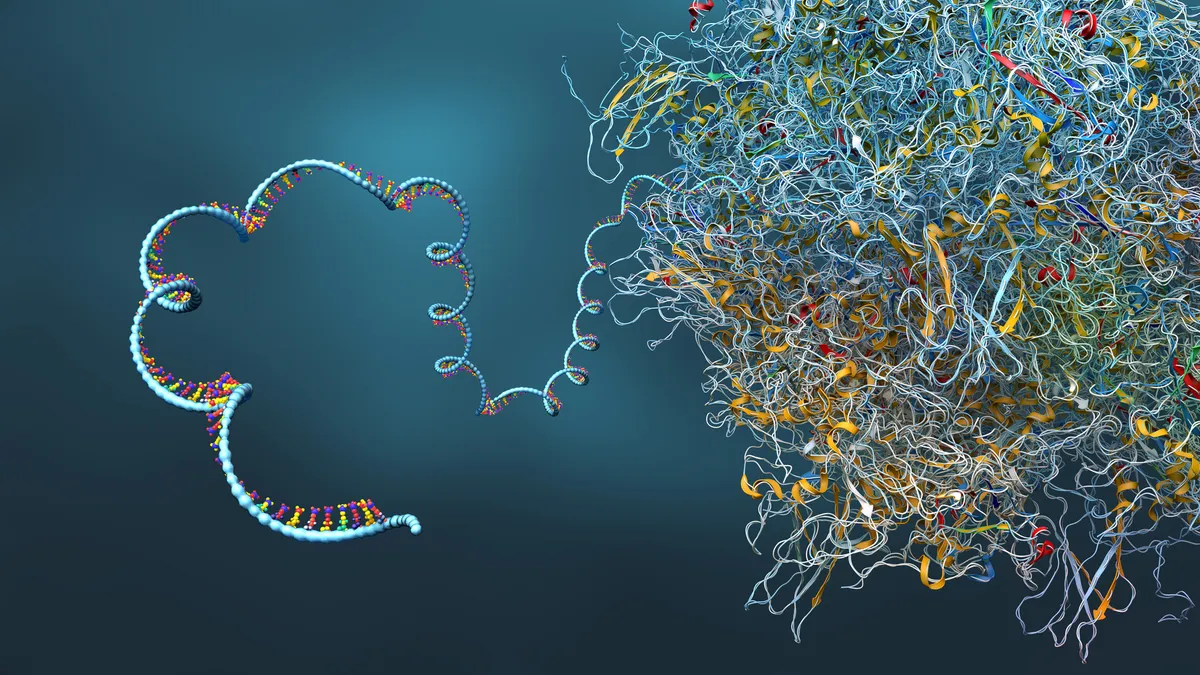Dive Brief:
- An experimental RNA editing medicine from Wave Life Sciences helped study participants with a rare liver and lung disease produce a protein their bodies can’t make, but wasn’t as effective in testing as investors had anticipated.
- Last year, Wave revealed promising results from the first two volunteers with alpha-1 antitrypsin deficiency to receive a single dose of its therapy in a clinical trial. On Wednesday, it said “therapeutically relevant” protein levels were observed in patients who’d received several doses, and similar results were seen in patients who received a single, higher dose.
- Wave said the findings support “monthly or less frequent dosing” and added that there were no serious adverse events or study discontinuations. Still, the amount of so-called AAT protein expressed in people who’d received that higher dose — or multiple administrations of a lower dose — wasn’t much greater than what was seen in those who got one low dose. Wave shares lost nearly a fifth of their value Wednesday.
Dive Insight:
Wave’s treatment, WVE-006, was the first of its kind to reach human testing.
WVE-006 edits RNA, the messenger molecules that turn DNA into proteins. That approach is seen as a potentially safer and more flexible alternative to DNA editing and, accordingly, has drawn interest from an array of investors and drugmakers. But RNA editing is also far less proven, making each study update from Wave a referendum on the concept.
Wave last year reported that, after receiving a single, 200 milligram dose of WVE-007, the first two patients in its trial began producing the “wild-type” AAT protein their bodies normally can’t. The total levels of AAT protein — including that important wild-type version — reached, on average, about 11 micromolars in blood plasma concentration within 15 days. That result surpassed investor expectations and met a threshold set by regulators for approval of AAT augmentation therapies.
Investors were hoping to see more powerful effects in Wave’s latest update, which involved eight patients who received a 400 mg dose and eight who’d gotten a series of twice-monthly injections at the lower dose. According to Wave, the former group hit about 12.8 micromolars of total AAT protein, on average, while the latter got to 11.9 micromolars. Wave said all side effects were deemed mild to moderate, and that there were no notable elevations in liver enzyme levels, which can be a sign of organ damage.
Wave also said a single patient spiked to over 20 micromolars during an “acute” response to the type of “exacerbation” that can damage the lungs of people with AATD. That finding suggests WVE-006 can help patients produce “protective protein when needed,” CEO Paul Bolno told analysts on a conference call.
The data show the therapy “can rise to meet the occasion, wherever it is, to drive down and protect during exacerbations,” he said. “That is the functional cure.”
Despite that apparent promise, Wave shares fell as much as 22%. Protein levels for the multidose group “narrowly hit” what Jefferies analysts projected as a positive result, while the higher dose data missed the firm’s mark, wrote Roger Song. Excluding the one patient with an acute response, the single dose group achieved a mean 11.8 micromolars of AAT protein, roughly the same result as the multidose group. The findings require “a bit more digestion” than WVE-006’s last readout, added Mizuho Securities’ Salim Syed.
Still, multiple analysts came to Wave’s defense. The share sell-off reflects “outdated investor expectations,” wrote Leerink Partners’ Joseph Schwartz, as the findings show “higher levels of AAT protein do not appear to be required to drive efficacy and protection in AATD.” Song and Syed added that all study groups hit the mark set by regulators, even if not by much.
The results are “still clinically meaningful,” Syed wrote.
Wave is testing monthly administrations of the higher dose and expects to deliver results in early 2026. Korro Bio, meanwhile, will share early results for a rival RNA editing drug for AATD later this year.
GSK has global rights to Wave’s AATD medicine under a broad partnership the companies signed in 2022.














